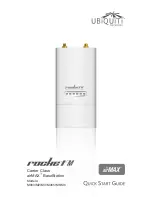
Related
Documentation
Calculating Power Budget and Power Margin for Fiber-Optic Cables on page 348
•
•
Understanding Fiber-Optic Cable Signal Loss, Attenuation, and Dispersion on page 347
Understanding Fiber-Optic Cable Signal Loss, Attenuation, and Dispersion
•
Signal Loss in Multimode and Single-Mode Fiber-Optic Cable on page 347
•
Attenuation and Dispersion in Fiber-Optic Cable on page 347
Signal Loss in Multimode and Single-Mode Fiber-Optic Cable
Multimode fiber is large enough in diameter to allow rays of light to reflect internally
(bounce off the walls of the fiber). Interfaces with multimode optics typically use LEDs
as light sources. LEDs are not coherent sources, however. They spray varying wavelengths
of light into the multimode fiber, which reflects the light at different angles. Light rays
travel in jagged lines through a multimode fiber, causing signal dispersion. When light
traveling in the fiber core radiates into the fiber cladding, higher-order mode loss (HOL)
results. Together these factors limit the transmission distance of multimode fiber
compared with single-mode fiber.
Single-mode fiber is so small in diameter that rays of light can reflect internally through
one layer only. Interfaces with single-mode optics use lasers as light sources. Lasers
generate a single wavelength of light, which travels in a straight line through the
single-mode fiber. Compared with multimode fiber, single-mode fiber has higher
bandwidth and can carry signals for longer distances. It is consequently more expensive.
Exceeding the maximum transmission distances can result in significant signal loss, which
causes unreliable transmission.
Attenuation and Dispersion in Fiber-Optic Cable
Correct functioning of an optical data link depends on modulated light reaching the
receiver with enough power to be demodulated correctly.
Attenuation
is the reduction in
power of the light signal as it is transmitted. Attenuation is caused by passive media
components, such as cables, cable splices, and connectors. While attenuation is
significantly lower for optical fiber than for other media, it still occurs in both multimode
and single-mode transmission. An efficient optical data link must have enough light
available to overcome attenuation.
Dispersion
is the spreading of the signal in time. The following two types of dispersion
can affect an optical data link:
•
Chromatic dispersion—Spreading of the signal in time resulting from the different
speeds of light rays.
•
Modal dispersion—Spreading of the signal in time resulting from the different
propagation modes in the fiber.
For multimode transmission, modal dispersion, rather than chromatic dispersion or
attenuation, usually limits the maximum bit rate and link length. For single-mode
transmission, modal dispersion is not a factor. However, at higher bit rates and over longer
distances, chromatic dispersion rather than modal dispersion limits maximum link length.
347
Copyright © 2013, Juniper Networks, Inc.
Appendix E: T4000 Router Cable and Wire Specifications, Pinouts, and Guidelines
Summary of Contents for T4000 -
Page 1: ...T4000 Core Router Hardware Guide Published 2013 08 28 Copyright 2013 Juniper Networks Inc ...
Page 18: ...Copyright 2013 Juniper Networks Inc xviii T4000 Router Hardware Guide ...
Page 26: ...Copyright 2013 Juniper Networks Inc 2 T4000 Router Hardware Guide ...
Page 30: ...Copyright 2013 Juniper Networks Inc 6 T4000 Router Hardware Guide ...
Page 36: ...Copyright 2013 Juniper Networks Inc 12 T4000 Router Hardware Guide ...
Page 78: ...Copyright 2013 Juniper Networks Inc 54 T4000 Router Hardware Guide ...
Page 90: ...Copyright 2013 Juniper Networks Inc 66 T4000 Router Hardware Guide ...
Page 98: ...Copyright 2013 Juniper Networks Inc 74 T4000 Router Hardware Guide ...
Page 100: ...Copyright 2013 Juniper Networks Inc 76 T4000 Router Hardware Guide ...
Page 108: ...Copyright 2013 Juniper Networks Inc 84 T4000 Router Hardware Guide ...
Page 144: ...Copyright 2013 Juniper Networks Inc 120 T4000 Router Hardware Guide ...
Page 168: ...Copyright 2013 Juniper Networks Inc 144 T4000 Router Hardware Guide ...
Page 176: ...Copyright 2013 Juniper Networks Inc 152 T4000 Router Hardware Guide ...
Page 178: ...Copyright 2013 Juniper Networks Inc 154 T4000 Router Hardware Guide ...
Page 190: ...Copyright 2013 Juniper Networks Inc 166 T4000 Router Hardware Guide ...
Page 200: ...Copyright 2013 Juniper Networks Inc 176 T4000 Router Hardware Guide ...
Page 202: ...Copyright 2013 Juniper Networks Inc 178 T4000 Router Hardware Guide ...
Page 212: ...Copyright 2013 Juniper Networks Inc 188 T4000 Router Hardware Guide ...
Page 314: ...Copyright 2013 Juniper Networks Inc 290 T4000 Router Hardware Guide ...
Page 354: ...Copyright 2013 Juniper Networks Inc 330 T4000 Router Hardware Guide ...
Page 358: ...Copyright 2013 Juniper Networks Inc 334 T4000 Router Hardware Guide ...
Page 389: ...PART 6 Index Index on page 367 365 Copyright 2013 Juniper Networks Inc ...
Page 390: ...Copyright 2013 Juniper Networks Inc 366 T4000 Router Hardware Guide ...
















































